From early on in my career, I’ve always loved being asked questions about nutrition, especially the weird ones.
Questions lead to fascinating discussions, which leads to research, which leads to more questions, then more research, which ultimately, maybe, (hopefully), leads to some answers.
This is something I still love and it’s one of the reasons doing interviews is so fun for me. The majority of the time, I don’t have a “cheat sheet” of questions ahead of time; it’s just rapid fire “tell me more about xyz.” My answers aren’t always the most eloquent, but you get a glimpse into the complexities of nutrition that you might not otherwise see.
Of all of the questions, clearing up nutrition for pregnancy myths is one of my favorite topics. You can only tackle misconceptions if you have a solid understanding of a topic from multiple angles (something I’ve certainly had a chance to get from the public policy angle, to research, to clinical practice, to writing and beyond).
Clearing Up Nutrition for Pregnancy Myths
Today, I’m sharing an interview I did with nutritionist, mama, and co-host of the Modern Mamas Podcast, Laura Bruner. She’s someone who walks the talk when it comes to real food and raising a healthy, mindful family (I say this with confidence; we’ve met up in person and she’s exactly the person you see/hear on her podcast and Instagram).
I’m slightly embarrassed to say that we released this interview several months ago and I’m just now getting around to sharing it with you. Better late than never! There were so many interviews recorded right around the time I released Real Food for Pregnancy that I’m still playing catch up.
Check out our interview on iTunes or Stitcher (episode 39 of the Modern Mamas Podcast).
Clearing up nutrition for pregnancy myths interview highlights:
- How my work in the gestational diabetes field made me realize how much was missing from conventional prenatal nutrition guidelines
- Epigenetics and how a mother’s diet during pregnancy can affect her baby’s risk of health problems later in life
- Misconceptions on carbohydrate intake: Why my recommendations are so different from current guidelines + myths about the necessity of a “minimum of 175g of carbs per day”
- Real food carbs versus refined carbohydrates (and a well-planned, nutrient-dense, low-carb diet versus junk food low-carb diet). Low carb doesn’t automatically mean healthy or nutrient-dense; we’ve gotta use nutritional common sense!
- The role of insulin resistance and mildly elevated blood sugar in certain birth defects
- Myths about salt during pregnancy (cutting back on salt actually carries risks!)
- Fish: nutrient intake versus mercury + how different countries approach the raw fish/sushi issue
- Considerations of a vegetarian diet in pregnancy (which I also covered in this post)
- Why the quality of fat you eat is so important (plus, how omega-6 fats and trans fats can be harmful, especially in pregnancy)
- Thoughts on postpartum nourishment (more in this post)
I hope you enjoyed our interview! There are so many more great episodes of the Modern Mamas Podcast; I encourage you to check it out!
If you have questions on prenatal nutrition myths, pop them in the comments below and I’ll put them on my list of topics to address in future interviews and blog posts.
Also, heads up… We’re gearing up to record round two in a few weeks where we’ll focus on nutrition for postpartum healing. Stay tuned. Until then, you’ll love this interview on postpartum recovery with real food.
Until next week,
Lily
PS – Curious to learn more about this whole “real food nutrition for pregnancy” idea?
You’re in luck because I’m giving away the first chapter of my book, Real Food for Pregnancy, right here.
This chapter includes a nutritional breakdown of a sample diet following conventional prenatal nutrition recommendations and a sample diet following my real food recommendations. Can you guess which one is more nutrient-dense?

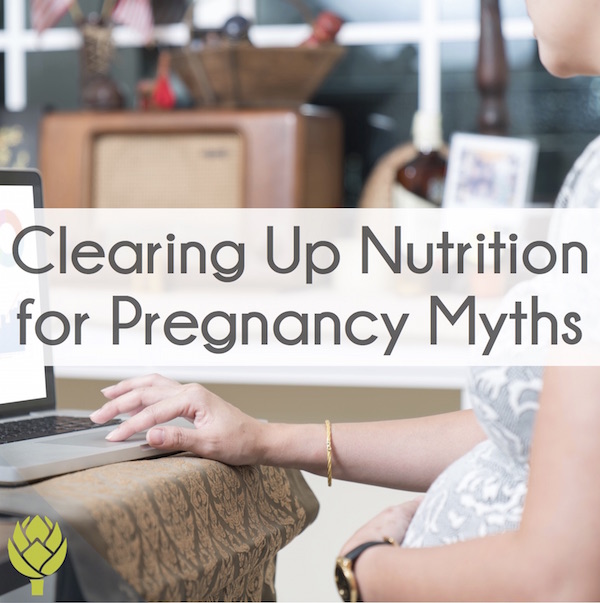

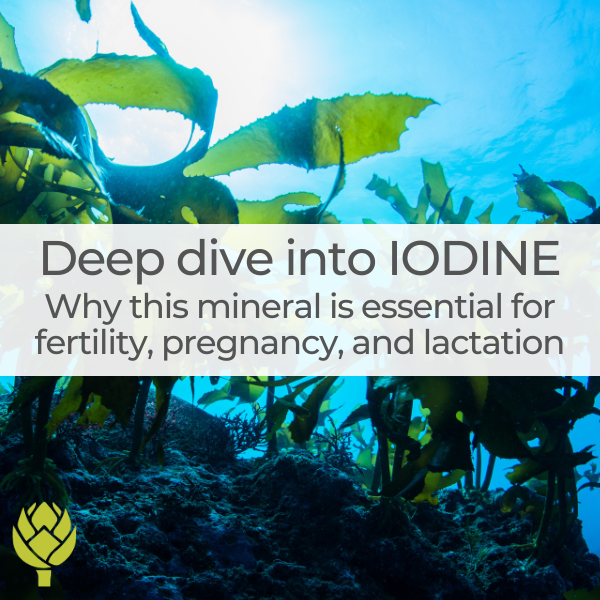
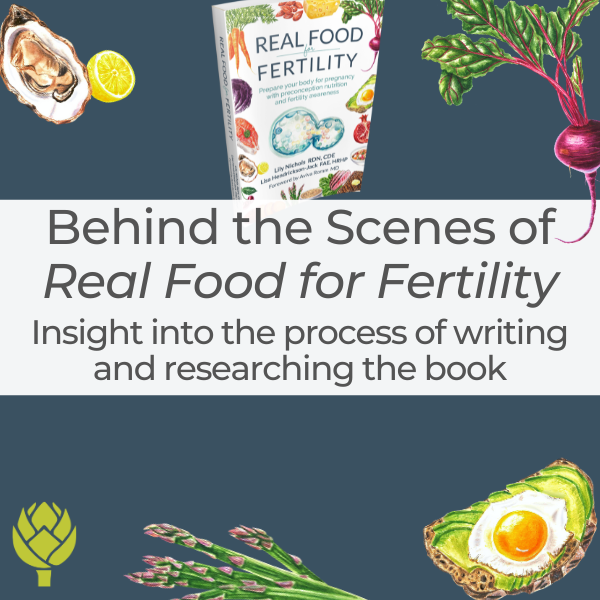
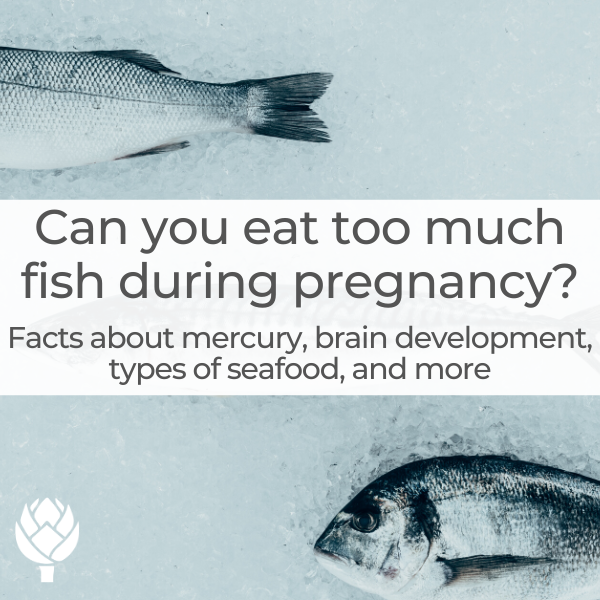
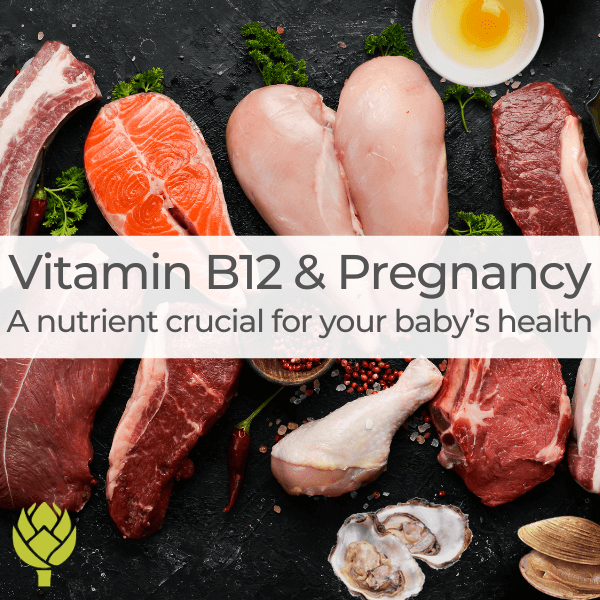



So I’ve heard that canned smoked oysters are ok during pregnancy and I’ve heard the opposite. On the label it warns against eating during pregnancy and part of the reason is for high levels of cadmium and lead in the oysters. Is this true? I would love to eat smoked oysters as they are so nutritionally dense but I worry about the cadmium/lead issue. Thank you!!! I love your book and it’s been so helpful this pregnancy!
Thanks for the Q. I think a post addressing toxins in a variety of foods may be warranted. Stay tuned.
I love your question Nikki! Im eating oysters right now while simultaneously googling if they are okay to eat while pregnant. I should know in a week if I am pregnant or not :). This book has been a guiding light for sure.
Hi Lily! You’ve mentioned in previous posts and in your latest book that our bodies want to keep our blood sugar ~20% lower than normal during pregnancy. Now that I’m in the second trimester I find that I want to snack a ton throughout the day, which even if the snacks are relatively low carb would still raise my blood sugar a bit. Is there any evidence on whether there are difference in outcomes (ex. more macrosomia) amongst women who eat more frequently throughout the day (and as a results keeping blood sugar elevated for longer) than amongst those who eat 3 – 4 larger meals?
Small, frequent snacks would mean smaller spikes in blood sugar, so go with your hunger/fullness cues. Most women are really hungry in the second trimester. Prevention of sharp blood sugar spikes is one of the reasons most GD advice is to do the 3 small meals/3 snacks pattern.
Hi Lily, I’ve recently learned about how nutritious bone broth is during pregnancy, but I’m just a beginner with all this and am wondering if there is a right or wrong way to make bone broth? Is it it better to use raw bones or can we use bones from a cooked chicken or beef? Can bones be reused? Can bones be frozen to make a broth at a later time? And how much of these bones to use? Do we use skin as well? Thank you so much!
There’s no right or wrong way. Cooking the bones prior to making broth (or saving bones from a roasted chicken or bone-in beef/pork roast and using those for broth) tend to taste better.
Yes, frozen bones can be used and any meat parts you deem inedible (knuckles, skin, connective tissue) can go right in the pot. Some bones can be re-used, like beef knuckle bones, but smaller bones (like chicken bones) are only used once.
There’s a recipe for bone broth in Real Food for Pregnancy. I typically fill the pot 3/4 full with bones, cover with water, and optionally add some flavoring ingredients, like a bay leaf, celery, onion, carrot, peppercorns, parsley, etc. Technically, all you need for the major nutritional benefit is bones + water.
Hi Lily! Loved this podcast and your book too. I’m not pregnant yet. I actually had been suffering from hypothalemic ammenorhea for the past few years. I just got my cycle back a few days ago, so I’m full force trying to get pregnant now! You are the number one person I trust with nutrition around pregnancy, so I wanted to ask a few questions. There were a few things I had been incorporating to help get my cycle back, and I’m wondering if they’d be worth stopping now, if they are things that should be avoided in pregnancy. They include adaptogens, such as ashwaganda, maca, and coQ10.
I had been taking glucose disposal agents with my high carb meals, especially around workouts. I’m all for controlling blood sugar, but I do consume a good bit of carbs (about 200-220grams/day) to fuel my weight lifting. Would you recommend stopping that agent and/or lowering carbs?
Lastly- are fermented foods safe for pregnancy? With the hormonal imbalances my acne has been awful. I’ve been eating fermented foods- sauerkraut, kimchi, kombucha, 3x/day to help with my acne. Is that ok during pregnancy?
Thanks so much for your time, Lily!
Colleen Forton
I’m not able to give personalized nutrition advice outside of a formal client-dietitian relationship. I’d suggest working with your provider on the above.
For general information, you’ll find detailed sections on carbohydrate needs, supplements in pregnancy, and fermented foods (and validity of typical “foods to avoid lists” in pregnancy) in Real Food for Pregnancy.
Hi Lily!
I have some questions and hope you have some answers 🙂
As I understand raw cacao and matcha tea is not very good to consume when pregnant, because of its caffeine? So I should not consume them at all during my pregnancy or can I have some? I’m 7 weeks pregnant and currently not consuming them.
The other thing – liver. There is so much information about how bad it is to consume during pregnancy. But believe it or not, I crave liver! So my question is, can I still eat them and if, how much in a day or week or month?
Today I ate cod liver in its own juice. I mixed it with hard boild eggs and nutritional yeast, salt, pepper – it’s like heaven! But again – is it safe to have? The cod liver I consume is in a can, has A and D vitamin, has no conservatives.
Just to add, I’m keto-ish with lots of salad, veggies and have been for 3 years. At the moment I do crave more carbs, but I manage to eat veggies and salad and fats too, but it gets more difficult every day – carbs want to take over! oh no! 😀
Candida! I had some show up on a GI map last year and I’m working on eradicating. We had intentions to start trying to conceive soon and I don’t want to go down the rabbit whole of protocol, test, protocol, test, etc. I feel like I’ll be pushing it off for forever.
Do you have any resources or advice you could share?